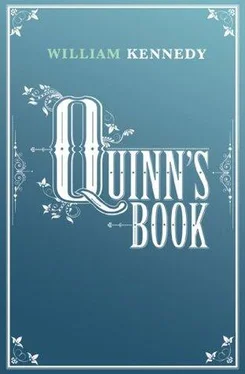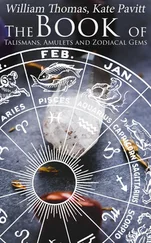“You will have to figure it out,” said Maud.
Then she was gone and we were busy with our goodbyes. In the kitchen I embraced Capricorn and Marty, with whom I had spent a great deal of time. In the foyer Magdalena and Hillegond wept grand tears on each other, and as we left the great house John the Brawn surreptitiously (though I witnessed it) thrust his hand high under Hillegond’s skirt to give her a farewell stroke. Into the carriage we lofted Magdalena’s trunk, John’s suitcase (which he’d retrieved from our old landlady), and the small traveling bags Hillegond had given Maud and me for our belongings.
I leaned out the carriage window for a final look at the mansion, which aroused pity and terror in my breast, but without Aristotle’s cathartic effect. I pitied myself both for my inability to ever dream of living in such a place again, and also for my loss of its comforts as I reentered the world outside its doors. And its receding presence aroused in me the terror of John the Brawn, the terror of the unknown, the terror of once again being a penniless orphan.
Hillegond’s driver took us to the pier at the Albany Basin, the mouth of the Erie Canal, which was opened because of the weeks of warm weather. Hillegond had suggested we save time by taking the train to the Schenectady highlands and boarding the packet boat there, as did everyone else. But Magdalena was against it, fearing for her safety behind a locomotive. Our final destination was Buffalo, but our first stopping point was to be Utica, where, said Magdalena, the opera house manager would welcome her, for on her last visit she had sold out the house for two weeks. Soon after we boarded the packet the boatmen hitched up the mules and we began our journey westward, scrunched in the salon with a half-dozen lumberjacks and drummers. I won no bed and John told me I could sleep on deck with the spare mule. I will refrain from reporting on the trivial details of the hours that followed, for they were hateful. I loathed being back on the canal, being looked upon as another higgler’s boy, one of those shiftless and worthless rungates who deserve whatever their drunken masters mete out to them in whippings, kicks, and cuffings, and whose destiny is either the penitentiary, the Almshouse, or an early grave.
The mules moved us along as I schemed in silence on ways to steal Maud away from John the Brawn and La Última. I conceived of first stealing a horse and carriage, sweeping her into my grasp, fleeing down a gravel carriageway, leaping to the reins, and driving off into the cherished night of freedom, into the unchartable challenges of love. We would ride with the west wind and the flight of wild geese, imposing on each other the most exquisite splendors of which our adolescent imaginations were capable.
As I entered my world of romantic intention I fell into a sleep that, for reasons I judge escapist, proved narcotic. Unable to resolve the theft of Maud, I thrust it even out of my dreams and awoke from that comatose condition facing the rising sun, curled up on dry ground. I was at the edge of the towpath, and what I saw in my first glance was a meadow to one side, canal to the other, no canalboat anywhere, no people and no houses, only a lone cow beside a small shack in a far field. My small clothing bag was beside me and, atop that, wrapped in a greasy newspaper, a ragged chunk of stale bread, the crust John the Brawn had promised me. Slowly I realized I was desolate. But far worse was the intolerable dawning that while I’d been trying and failing to bring about the theft of Maud, scurrilous John the Brawn had stolen her from me.
I WEPT DESOLATED TEARS and felt the spiny urchins invading my soul. I shouldered my bag and walked eastward along the towpath, not knowing what town I was near, knowing only my position beneath the sky. Boats, mules, horses, and men passed, but I had commerce with none of them. I screamed, or thought I did, but wasn’t certain. I began a new scream that I would surely hear, but the sound was inconsequential to the rising sun. I stifled it and picked up a green stick. I walked until I found the correct rock and then I beat the rock until the stick was limp sinews. This also was inconsequential and I began to believe then that no act, no thought of mine, could shape a response equal to the feeling the theft of Maud had generated in me.
I began to dwell on what it meant to find your love and then to have it taken from you, framing the question with a fifteen-year-old brain and a body in transition toward nefarious impulses. Even so, I could instantly see what a hollow game this was. If my condition was desolation, what, then, was Maud’s? I was at least able-bodied, male, unsubjugated, and capable of self-sustenance, whereas she was this fragile and precocious visionary in a state of peril. Who would save her from the ritual bawdry that awaited her? What guardian quality in John the Brawn, that overmastering Priapus, would protect her from life-long invasion by the lust of strangers? The child was, to my mind, about to become a spangled womb, a witch of beauty wasted on the bloody and pecunious bed of ravaged hymen.
I yelled to a passing boatman, who told me I was twelve miles from Schenectady, and as I walked on I thought of telling Maud now all that had befallen me before I met her, those events that had brought me to the moment when I saved her from the bottom of the river. I thought the telling might even reach Maud in Utica, just as Hillegond had faith that her feelings would reach the kidnapped Dirck.
Coupling Dirck and Maud I realized I had witnessed the theft of two lives, and I brooded that Dirck, Maud, I, and all the others were parts of a great machine, generating immeasurable power in the universe. I drew little comfort from this thought for I seemed too minuscule a part to be of any significance. Men like John the Brawn with his strength, Will Canaday with his brain and his newspaper, and the captors of Dirck with their will to evil were the great turbines, were they not? Children like myself waited their turn at power.
But then I thought, no. Age alone does not determine whether one wields power, or even whether one remains a child. My own childhood had been terminated for me on a warm morning in April 1850, under the rising sun on the banks of the Erie Canal. There and then, Daniel Quinn, late a boy in possession of neither safety nor joy, a boy being shaped by fire, flood, ice, and the less comprehensible barbarities of men and women, was entering into a creaturehood of a more advanced order: young animal confounded — solitary, furious, eccentric, growing bold.
This is the message I sent through the sky to Maud about my new condition:
Maud, I begin on an event that took place a month before the raging of the plague. A stranger in old clothes walked crookedly up Van Woert Street and collapsed on Rhatigan’s front stoop. Old Lydie Rhatigan came out in her apron, her broom in hand to shoo him away. But one look at him changed her mind.
“You’re sick, is it?” said Lydie.
“My left leg is dead,” the man said to her. “I couldn’t walk another step. Feel the leg if you like.”
“I’ll do no such thing,” said Lydie.
“Death is moving in me,” said the man, and he shifted his position so that his back rested against the stoop’s iron railing and his dead left leg dangled off the bottom step. The right leg he stretched along the width of the stoop.
“It’s going into the right leg now,” he said. “Two more minutes and the right’ll be as dead as the left.”
“What ails you?” asked Lydie.
“The death is what it is.”
“What kind of death?”
“The only kind.”
“Get on with ye. Is it a plate of food you’re after?”
“Not anymore.”
“Well, you can’t clutter the stoop like this.”
Читать дальше












